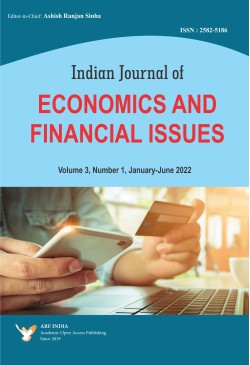
Indian Journal of Economics and Financial Issues
Frequency :Bi-Annual
ISSN :2582-5186
Peer Reviewed Journal
AN EMPIRICAL ANALYSIS OF THE IMPACT OF MONETARY POLICY ON BANK LENDING IN NIGERIA
The study examined the impact of monetary policy on Banks’ lending in Nigeria. The study covered the periods of fifteen years 2001 to 2015 using quarterly data. The study adopted bound testing approach for co-integration, error correction model developed within an Autoregressive Distributive Lag (ARDL) Model and granger causality test to assess both long-run equilibrium relationship and direction of causality between monetary policy instruments on bank loan and advances. Using the approach, the study found evidence in support of existence of long-run relationship among the variables in the model at 5% level of significance with the exception of real exchange rate that remained insignificance. The study also established the existence of unidirectional causality runs from loan and advances to real exchange rate without feedback at 5% significance level. The result further revealed that, cash reserve requirement and money supply are significance and positive, while monetary policy rate and real exchange rate negatively impacted on loan and advances in the long run. The short run result also indicated that, monetary policy rate, cash reserve requirement and real exchange rate have significance negative influence on loan and advances, while money supply impacted on loan and advances positively. The study recommended that, monetary authority should focus more on monetary policy rate and real exchange rate quality, in order to improve banks lending. Equally, the authority should design optimum interest rate on deposit and loan that will encourage banks lending in Nigeria.
Keywords: Monetary policy, Interest Rate, Monetary Authority, Real Exchange Rate, Money Supply, Nigeria
JEL Classification: E52, E43, E59, E51
RURAL LIVELIHOOD IN ODISHA: A CASE STUDY FROM TWO BLOCKS OF WESTERN ODISHA
SOCIAL AWARENESS OF EMOTIONAL INTELLIGENCE AND COMPETITIVE AGGRESSIVENESS IN ENTREPRENEURSHIP ORIENTATION IN NIGERIA
ORGANISATIONS
MULTIPLE TAXATION AND MICROFINANCE BANKS SUSTAINABILITY IN AKWA IBOM STATE, NIGERIA
SELF-MANAGEMENT OF EMOTIONAL INTELLIGENCE AND ITS EFFECT ON THE INNOVATIVENESS COMPONENT OF ENTREPRENEURSHIP ORIENTATION
CURRENT STATUS OF RESEARCH ON RURAL NON-FARM SECTOR: ANALYSIS OF LITERATURE
CONSUMPTION EXPENDITURE PATTERN OF HOUSEHOLDS WITH OLDER ADULTS IN KARNATAKA; EVIDENCES FROM LONGITUDINAL AGEING STUDY IN INDIA (LASI)